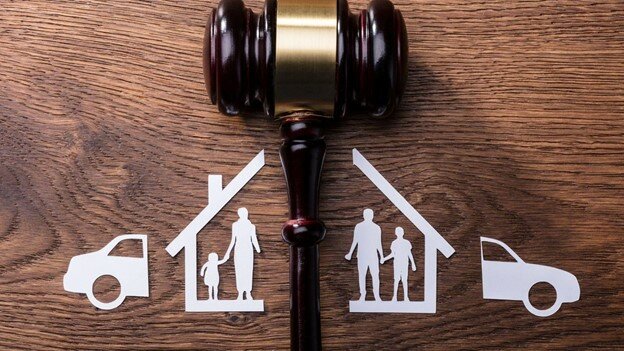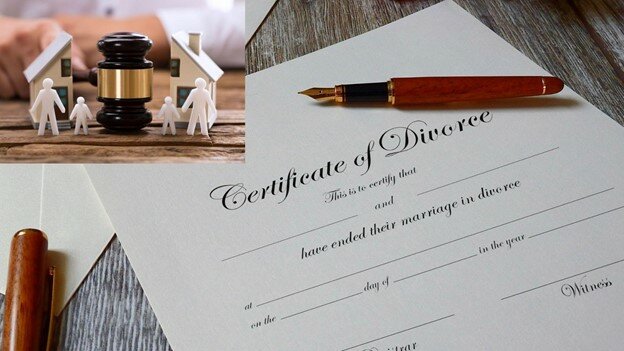
Are you contemplating a divorce and concerned about how to sell a house during a divorce? When you’re going through the complex process of divorce, many things might be perplexing, especially when it comes to selling your property.
At this point, you should seek the advice of a real estate specialist who can assist you in determining what to do with the property in the event of a divorce and whether you need to sell your home.
Working with a real estate business like Guardian Home Buyers can make things easier and smoother. We go above and beyond to meet all their client’s emotional and financial home selling demands.
At Guardian Home Buyers, we understand that selling the house makes the most sense for monetary, social, or situational factors in many circumstances. We buy in as-is condition, understanding your emotional stress. In this post, we’ll go over whatever you need to know about selling a house after separation, including house selling choices.
What Happens To The House In A Divorce?
Many couples who decide not to live together are curious to know what happens to the house in a divorce and who keeps the house in divorce.

One of the three primary outcomes partners observes whenever they get involved in property disputes due to divorce.
- The spouse that has the kids keeps the house, uses it, gets the right to occupancy of the home until the kids reach the age of 18.
- One spouse purchases the legal right. As a result, he keeps the house.
- Both spouses agree to sell the house and divide the equity.
How To Split A House In A Divorce
As splitting the house is quite a complicated process and depends on various factors, the couple should figure out the different ways in which they can break the house in a divorce.
Here are a few suggestions that will help you complete the future of a house. Yet, choosing any particular option also depends on the cooperative behavior of your partner.
- Divide Large Assets
Couples with many joint assets, in the form of real estate and residences, must split their assets so that each person has ownership of the assets. A real estate business should be recruited to advise on the current worth of each investment and propose a balanced solution.
Consulting real estate specialists, such as those found at Guardian Home Buyers, may make settling huge assets a breeze.
2. Proceed with co-ownership plan
When a couple opts for a co-ownership plan, which is almost always the case in a peaceful divorce, they agree to divide the mortgage payments and all taxes and expenditures. It’s a fantastic option, especially if partners have children.
The disadvantage of this approach is that if one partner becomes financially disabled, it will impact the other. Furthermore, if one of the partners has not lived in the house for five years, they will be unable to claim the Home Sales Tax Exemption.
Should I use an agent or find an investor?

In some cases, contacting an agent is appropriate. But, when you need a fast solution you should contact an investment firm that is ready to address all your house selling concerns right away.
Speaking with an agent is a time-consuming and complex procedure, whereas investors will buy your property in cash, aware of your situation’s risk.
Here at Guardian Home Buyers, we can help you sell your home if you’re going through a divorce. Feel free to schedule your free consultation on what to do with the house in a divorce.
Fill This Form And Get Your Offer In Less Than 24 Hours
Who Keeps House In Divorce?

When the marital relationship breaks with the bitter dispute, each partner wants to know who keeps the house in divorce. There is no final answer to this question because every divorce is different and depends on how individuals behave and react to their divorce.
As discussed earlier, both partners can plan to co-own the house, but in several cases, it is not possible. At this stage, if one of the partners wants to keep the house, he should proceed with buying out the other party.
How do I keep the house?
You can keep the house if you can buy out your partner. The buyout might be for more or less than half of the market price, depending on each party’s wage, monetary obligations to the property, and the home’s earning capability.
If you don’t want to have a back-and-forth conversation, you can settle for half of the home’s market worth.
Selling a house after the divorce agreement

Sometimes selling the house is a necessary step after a divorce agreement. At this stage, if you are also confused on should I sell the house after the divorce agreement, you need to know when it should be your preferred option.
- One of the partners cannot afford the expenses
When both partners own property, they have to afford a mortgage, property taxes, maintenance, and insurance, but the situation becomes quite problematic when one partner cannot afford all this and is not in the position to cover the expenses.
Remember that in the case of single ownership, you will never be able to enjoy Home Sales Tax Exclusion, as this exemption is only for married and happily-settled partners.
If you think that your divorce is affecting your finances and your income stream will convert from two to one, you need to sell your house after the divorce agreement.
2. You want to avoid the expenses of a legal battle
When both partners do not agree to sell the house after the divorce agreement, they will have to rely on legal estimates about the future value of the home. These estimates are never 100% accurate, and splitting the money becomes a problem. So the couples can also choose to sell the house without complicating the financial processes further.
3. You fear the liability risks and difficulties
As you cannot force the other partner to keep the house, you sometimes have to be a single homeowner.
While one spouse may have enough money to fulfill the mortgage and all responsibilities, this does not mean the other spouse is no longer liable.
They’ll have to talk to a creditor and refinance the property, living on a single wage for a house most likely purchased with two. Even if the spouse who wants the property has the cash to buy out the other, a lender may disagree that they will be able to keep up with the increased payments.
Do you have to sell your house in a divorce?
If it is a peaceful divorce and both partners are ready to cooperate then it is not necessary to sell your house in a divorce. Yet, on certain occasions when one partner is not financially stable or does not agree to live in the house, you need to plan to sell your house.
Your unique circumstances, financial stability, and the type of divorce can decide whether you have to sell your house in a divorce. For getting ultimate guidance, reach out to Guardian Home Buyers who will guide you if selling your house in divorce is a suitable option for you. They will also guide you on how to sell a house during a divorce.
Can you divorce and live in the same house?
When you are not ready to sell your house and leave it, you will definitely want to know whether it is possible for you to be separated and live in the same house. The answer to this question is: yes you can live in the same house.
But, the court will ask you for some extra information along with your divorce application. All the information must be present in an affidavit which is a signed statement of being true and honest.
The affidavit should address the financial repercussions of the marriage, the nature of the home, social aspects, the presence of sexual interactions, and the character of loyalty.
Final verdict
Whenever couples decide to live together their home is the most important asset for them. But if a challenging phase of divorce comes in life, various questions arise in the mind about selling the home and what to do with the house in divorce.
Selling a house after a divorce agreement seems difficult as your home has an emotional and sentimental value. Yet, both partners know that they are not married to the house and have to leave it in most cases.
If you are also going through the challenging phase of divorce and want to know how to sell a house during a divorce, feel free to discuss all your home selling problems and get real estate solutions by reaching out to us.
